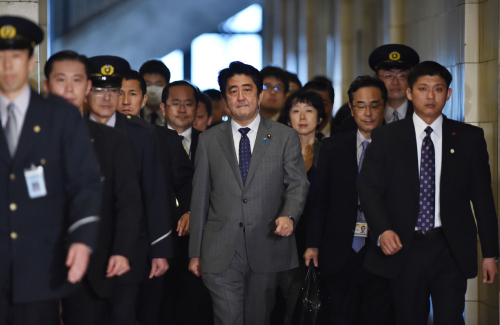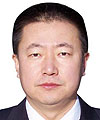 |
|
MONEY MATTERS: Japanese Prime Minister Shinzo Abe (center) arrives at the National Diet to attend a budget committee session of the House of Representatives in Tokyo on January 30 (CFP) |

Japan's cabinet on February 10 adopted a foreign aid charter stating for the first time that its official development assistance (ODA) program can be used to support foreign armed forces. The newly enforced Development Cooperation Charter, previously known as the ODA Charter, said military aid is allowed to be used in non-combat operations such as disaster relief, infrastructure building and coast guard activities.
The administration's murky language may allow for flexibility in the charter's use.
The new charter said, "If the military or military officers of recipient countries are involved in development cooperation for the purpose of [improving] the people's livelihood and nonmilitary activities such as disaster relief, [Japan] will consider individual programs case by case, while taking into account the significance of extending such aid."
This first revision of Japan's ODA Charter since 2003 effectively lifted the ban on using ODA funds to assist foreign military forces, reflecting Prime Minister Shinzo Abe's push to make a "proactive contribution to peace based on the principle of international cooperation."
Adding military aid to the charter reveals a critical change to Japan's ODA policy and breaks the country's long-standing constitutional commitment to peace. The charter said ODA aid also includes activities in the fields of maritime, space, cyber security, counterterrorism, and mine clearance.
In addition, "Japan will utilize its ODA in a strategic and effective manner," the charter said.
Furthermore, the charter for the first time has referred to "national interests" as objectives in the provision of foreign aid, according to Japan's Foreign Ministry officials.
Thus far, Japan's ODA primarily targets infrastructure construction and poverty reduction in recipient countries, and is disbursed in such forms as loans, grants and technical cooperation.
Accelerating military exports
Abe's administration has been working to break the taboo limiting the country's security apparatus in three steps: lifting the ban on arms exports, asserting the right of collective self-defense, and adding military aid to the ODA program. In the past year, the first two objectives have already been realized. The third step is under way.
In the past, the Japanese Government has consistently declined to use ODA for military purposes, stressing repeatedly that providing military aid does not conform to the charter's principles. While initially reserved for promoting economic development, the Abe administration has fundamentally altered the tone of the program.
The move has sparked speculation over whether the same aid could be funneled for military purposes. In response to these concerns, the Japanese foreign ministry said the charter was designed to avoid aiding parties involved in international conflicts. A similar explanation was given by the Abe administration to quell concerns over the right of collective self-defense last year.
Right-wing Japanese politicians have recently been trying to revise the restrictive pacifist constitution, but have been met with resistance both domestically and abroad. They have instead sought to relax the restrictions against using the ODA for military purposes.
